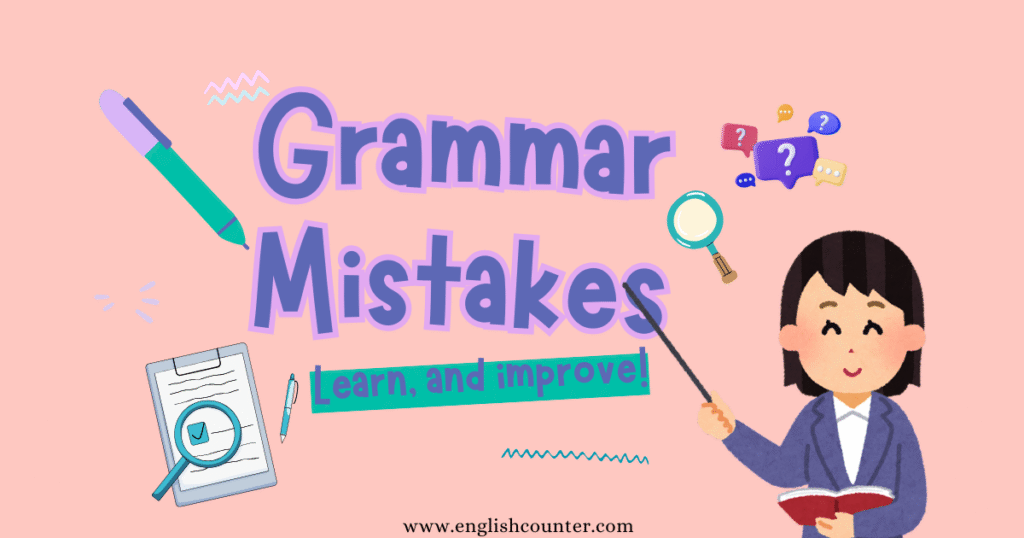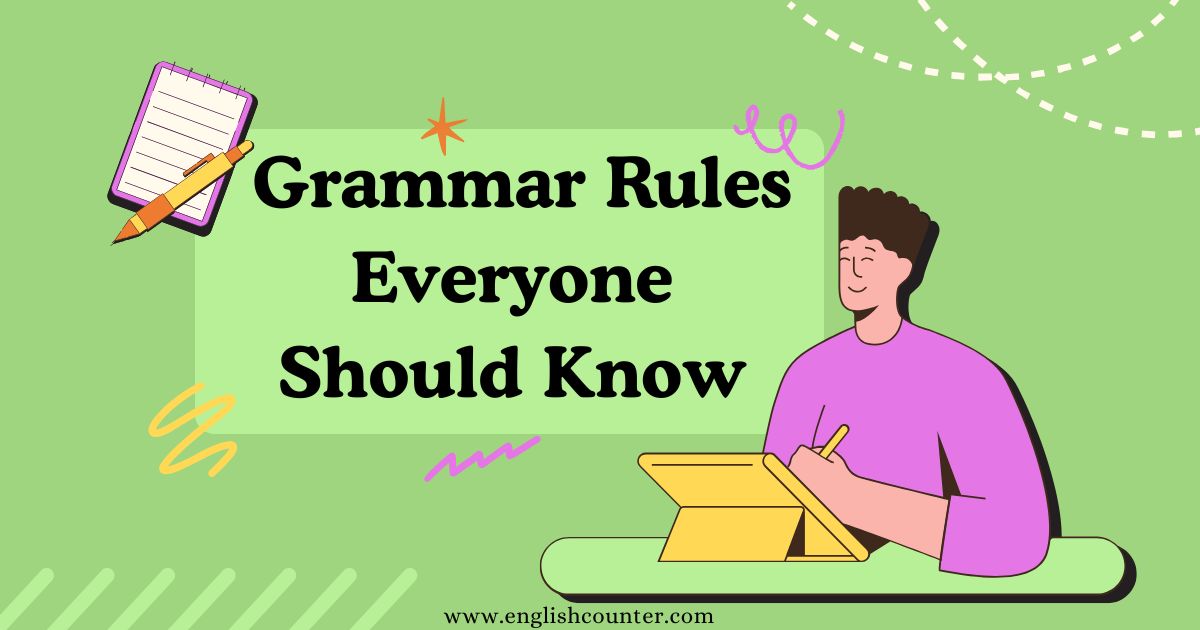25+ Most Common English Grammar Mistakes
Grammar mistakes are more common than you think. It can be embarrassing when someone points out an error in your writing, but keep in mind that everyone makes grammar errors from time to time.
The good news? Once you learn how to spot them, you can fix them easily. In this post, we’ll look at 25+ of the most common English grammar mistakes, explain why they happen, and show you the correct way to use them.
What Is a Grammar Mistake?
A grammar mistake is any misuse of words, punctuation, or sentence structure that breaks standard rules of English. These mistakes make writing more challenging to read and can even change the meaning.
It’s also important to note that not every deviation is “wrong.” Language evolves, and writers sometimes break style rule. But if you want your writing to be clear and professional, it’s best to master the basics first.
25+ Common English Grammar Mistakes to Avoid

1. Punctuation Errors
Using punctuation marks incorrectly, such as commas, semicolons, apostrophes, parentheses, and hyphens, can change the meaning of a sentence or make it unclear.
Examples:
- Let’s eat, Grandma. ✅
- Let’s eat Grandma. ❌ (missing comma)
- I have a meeting tomorrow; I can’t go out tonight. ✅
- I have a meeting tomorrow, I can’t go out tonight. ❌ (should be a semicolon)
- It’s a beautiful day. ✅
- Its a beautiful day. ❌ (missing apostrophe)
- He finally answered (after taking five minutes) that he was tired. ✅
- He finally answered after taking five minutes that he was tired. ❌ (missing parenthesis for extra information)
- He is a well-known actor. ✅
- He is a well known actor. ❌(without hyphen)
Correct punctuation ensures your writing is clear and easy to understand.
2. Title Capitalization
Titles should capitalize nouns, pronouns, adjectives, verbs, and adverbs; articles, prepositions, and conjunctions stay lowercase unless first/last word.
Examples:
- The Cat in the Hat ✅
- The cat In The Hat ❌
- Things Fall Apart ✅
- Things fall Apart ❌
Proper title capitalization makes content professional and readable.
3. Possessive Nouns
Possessive nouns show ownership. We use an apostrophe to indicate possession.
Examples:
- This is James’s car. ✅
- This is James car. ❌
- The students’ books are on the table. ✅
- The students books are on the table. ❌
Using possessive nouns correctly shows ownership clearly and avoids confusion.
4. Subject–Verb Agreement
Singular subjects take singular verbs and plural subjects take plural verbs.
Examples:
- The dog runs fast. ✅
- The dog run fast. ❌
- The players are winning. ✅
- The players is winning. ❌
Subject–Verb Agreement keeps grammar consistent.
5. Misplaced Modifiers
Modifiers must be close to the word they describe.
Examples:
- She almost drove her kids to school every day. ✅
- She drove her kids to school almost every day. ❌
- The man in the car with a hat waved. ✅
- The man waved in the car with a hat. ❌
Modifiers placement changes meaning.
6. Double Negatives
Two negatives = positive, avoid in standard English.
Examples:
- Nobody likes being late. ✅
- Nobody don’t like being late. ❌
- I don’t know anything. ✅
- I don’t know nothing. ❌
Double negatives always confuse.
7. Your vs You’re
Your shows possession. You’re means “you are.”
Examples:
- This is your pen. ✅
- This is you’re pen. ❌
- You’re welcome to join us. ✅
- Your welcome to join us. ❌
If you use the wrong one, it confuses meaning.
8. Its vs It’s
Its shows possession; It’s = it is.
- It’s cold outside. ✅
- Its cold outside. ❌
- The dog wagged its tail.✅
- The dog wagged it’s tail. ❌
A small apostrophe changes the meaning.
9. Their vs There vs They’re
Their shows possession. There means a place. They’re = “they are.”
Examples:
- They’re going to their house. ✅
- There going to they’re house. ❌
- Please put the bag over there. ✅
- Please put the bag over their. ❌
Mixing these makes your writing unclear.
10. Who vs Whom
Who is the subject. Whom is the object.
Examples:
- Who is coming to dinner? ✅
- Whom is coming to dinner? ❌
- To whom should I give this letter? ✅
- To who should I give this letter? ❌
Correct choice makes your sentences sound natural.
11. Who’s vs Whose
Who’s = who is. Whose shows ownership.
Examples:
- Who’s ready for the exam? ✅
- Whose ready for the exam? ❌
- Whose bag is this? ✅
- Who’s bag is this? ❌
Avoids confusion between identity and possession
12. Affect vs Effect
Affect is usually a verb. Effect is typically a noun.
Examples:
- The weather can affect your mood. ✅
- The weather can effect your mood. ❌
- The new rule had a positive effect on students. ✅
- The new rule had a positive affect on students. ❌
Mixing them changes your sentence’s meaning.
13. Then vs Than
Then shows time/order. Than is for comparison.
Examples:
- First we ate, then we went for a walk. ✅
- First we ate, than we went for a walk. ❌
- She is taller than her brother. ✅
- She is taller then her brother. ❌
One letter changes the meaning completely.
14. Less vs Fewer
Less is for uncountable nouns. Fewer is for countable nouns.
Examples:
- We had fewer guests this year. ✅
- We had less guests this year. ❌
- There is less water in the glass. ✅
- There are fewer water in the glass. ❌
Important for correct comparison.
15. Me vs I
Use I as the subject, me as the object.
Examples:
- Sarah and I went shopping. ✅
- Sarah and me went shopping. ❌
- He invited John and me to the party. ✅
- He invited John and I to the party. ❌
Always Keeps subject-object roles clear.
16. Lay vs Lie
Lay requires an object. Lie does not.
Examples:
- I need to lie down for a while. ✅
- I need to lay down for a while. ❌
- She laid the book on the table. ✅
- She lied the book on the table. ❌
Often confused in daily speech, so use them carefully.
17. To vs Too vs Two
To = direction/verb. Too = also/excess. Two is a number.
Examples:
- I’m going to the market. ✅
- I’m going too the market. ❌
- She bought two books. ✅
- She bought to books. ❌
Sounds same but different, so use according to the requirement.
18. Everyday vs Every day
Everyday means ordinary, while every day means each day.
Examples:
- These are my everyday shoes. ✅
- These are my every day shoes. ❌
- I exercise every day. ✅
- I exercise everyday. ❌
Spacing changes meaning, so while writing checked it.
19. Between vs Among
Between means two, and Among means more than two.
Examples:
- Share the cake between you and me. ✅
- Share the cake among you and me. ❌
- Share the cake among friends. ✅
- Share the cake between friends. ❌
You can easily remember by simple rule: two = between, many = among.
20. Principle vs Principal
Principal means head or main, while Principle means rule.
Examples:
- The school principal is kind. ✅
- The school principle is kind. ❌
- He has strong principles. ✅
- He has strong principals. ❌
Trick to remember: Principal is for person and principle is for rule.
21. Farther vs Further
Farther shows physical distance and further means figurative or additional.
Examples:
- He ran farther than me. ✅
- He ran further than me. ❌
- We need further discussion. ✅
- We need farther discussion. ❌
Easy trick to remember: Farther is for distance while further is for depth/extent.
22. Amount vs Number
Amount is used for uncountable, while Number is used for countable.
Examples:
- A large number of people attended. ✅
- A large amount of people attended. ❌
- A large amount of sugar was added. ✅
- A large number of sugar was added. ❌
Use according to countable and uncountable nouns.
23. A lot vs Allot vs Alot
A lot means “many,” allot means “to distribute,” and alot ❌ is not a real word.
Examples:
- We had a lot of homework. ✅
- We had alot of homework. ❌
- The teacher will allot extra time for the test. ✅
- The teacher will a lot extra time for the test. ❌
Note: “alot” doesn’t exist in standard English.
24. Like vs Such as
Like means “similar to,” while such as is used for giving examples.
Examples:
- I enjoy fruits such as apples and bananas. ✅
- I enjoy fruits like apples and bananas. (less precise)
- Big cities such as New York and London are expensive. ✅
- Big cities like New York and London are expensive. (suggests similarity, not examples)
Use such as when you mean “for example.”
25. Each vs Every
Each refers to two items and individual items in a group, while every refers to three or more items and group as a whole.
Examples:
- Each student has a book. ✅
- Every student has a book. ✅
- Every student have a book. ❌
- Each and every student has a book. ✅ (common but wordy)
Don’t confuse singular and plural verb usage. Both each and every take a singular verb.
26. More than vs. Over
More than is preferred for numbers, over is for physical position (though “over” for numbers is now common).
Examples:
- More than 100 people attended the event. ✅
- Over 100 people attended the event. (accepted in modern English)
- He jumped over the fence. ✅
- He jumped more than the fence. ❌
Use more than for quantities if you want to be precise.
27. May vs. Might
May tells possibility, might shows weaker possibility or past.
Examples:
- We might go to the park later. ✅
- We may have went yesterday. ❌
- She may call tonight. ✅
- She might calls tonight. ❌
Subtle but essential difference.
28. Past vs Passed
Past means a time that has gone by; passed is the verb form of pass.
Examples:
- I walked past the school. ✅
- I walked passed the school. ❌ (wrong verb form)
- She passed the exam last week. ✅
- She past the exam last week. ❌ (wrong word)
Using the wrong word makes the sentence meaningless.
29. Compliment vs Complement
Compliment means praise while complement means completes something that completes or goes well with something else.
Examples:
- She gave me a nice compliment. ✅
- She gave me a nice complement. ❌
- The scarf complements her dress. ✅
- The scarf compliments her dress. ❌
Easy to confuse but both words have different meanings.
Conclusion
These 25+ common grammar mistakes can make writing unclear or confusing. By understanding the difference between similar words and using correct grammar, you can express ideas more clearly and confidently.
Keep practicing, and soon correct grammar will become a natural habit.


